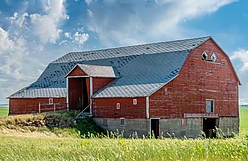TERESA in BEDFORD writes:
“Can you build a pole barn in a bank barn style?”
Mike the Pole Barn Guru answers:
 A bank barn is a style of barn noted for its accessibility, at ground level, on two separate levels. Often built into hill sides or banks, upper and lower floors could be accessed from ground level, one area at hill top, other at hill bottom.
A bank barn is a style of barn noted for its accessibility, at ground level, on two separate levels. Often built into hill sides or banks, upper and lower floors could be accessed from ground level, one area at hill top, other at hill bottom.
Bank barns were a popular 19th-century U.S. barn style. These structures were sometimes called “basement barns” because of their exposed basement story.
For Pennsylvania barns, upper floor was a hayloft and lower a stable area. Barn doors were typically on sidewalls. With William Penn’s promise of freedom and inexpensive land, many settlers came to Pennsylvania. Among these settlers were Germans, who began to build bank barns on their land. Many other settlers followed this practice, and it was soon the most common type of barn in Pennsylvania during the colonial era. Pennsylvania Barns are a specific type of bank barn with a forebay, a projecting floor on one or more barn sides. All forebay barns are bank barns, but not all bank barns are forebay barns.
New England barns are from a different tradition than Pennsylvania Barns. In New England, barn doors are always on gable ends. Cows were on main level, hay in a mow on main level and/or above in haylofts, possibly grain storage on main level, sometimes a tack room or workshop, and the basement was used for manure management and other tasks. New England barns, developed in the early 19th century, became the most popular barn type after 1850.
With today’s history lesson done – a bank barn if effectively just a ‘daylight’ or ‘walk out’ basement. We have provided a plethora of such fully engineered post frame buildings and would be pleased to discuss your building ideas further. One of our Building Designers will be reaching out to you, or call 1.866.200.9657 for immediate service.






